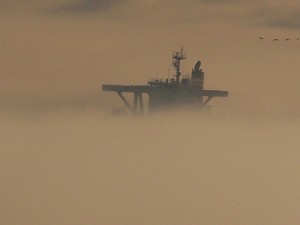Leader: The one they call when there is fog
 A couple of weeks ago I was at a conference listening to Andy Stanley speak about leading in times of uncertainty. What he said was compelling: leadership is not needed unless there is uncertainty. Managers are always necessary to keep an organizational machine running, but leaders exist to ensure an organization clearly knows where it is going and to make the tough calls that may be necessary to get there.
A couple of weeks ago I was at a conference listening to Andy Stanley speak about leading in times of uncertainty. What he said was compelling: leadership is not needed unless there is uncertainty. Managers are always necessary to keep an organizational machine running, but leaders exist to ensure an organization clearly knows where it is going and to make the tough calls that may be necessary to get there.
Uncertainty is a normal fact of life in any organization. But though a leader may be a bit uncertain about a situation or even about the future, ambiguity is never OK. Clarity is essential for a leader if he or she is going to be effective.
It reminded me about a conversation I had recently with my wife’s aunt and uncle. Uncle Michael is a merchant marine, which means that he has worked his whole life on huge ships delivering goods to ports all over the world. Recently he was offered a promotion to serve as the Captain on one of the trips, a promotion that he accepted.
I asked what the captain of a ship does; his answer surprised me. He said that during a voyage there isn’t a whole lot that you are required to do as captain. You check in with the officers to make sure that they have their individual areas taken care of. When you pull into port you have some decisions to make regarding personnel, supplies, etc… There is plenty a captain can do, but not much he has to do. Regardless, it is the most stressful job on the ship.
When he was wrestling with the decision regarding whether to take the post, Aunt Laurie asked him the million-dollar question: “Do you want to be the one they call when there is fog?” You see, when everything is ‘smooth sailing’ on the open sea, a captain of a major ship might be able to lock himself in his suite for weeks at a time and play video games (though that obviously shows a lack of work ethic for which captains are chosen), but when the pilot of the ship encounters a rough situation that requires a decision that will affect everyone on board, he calls the captain. For instance, Uncle Michael said that this can often happen when there is much fog in a port. Clear decisions need to be made in the thick soup of uncertainty, and nobody wants to be on the hook for making the wrong call—so they call the captain (who is responsible to make the call, right or wrong).
The captain may not always know the absolute best course of action, but he must project total confidence and zero ambiguity to his crew as he makes the call to navigate through a tough situation. A bridge full of waffling crew second guessing one another will do nothing to help in that situation. This is not about false bravado—pretending you have no doubts—but about clarity of direction even when you are not 100% sure of the outcome. Seek input from the officers—get the best wisdom and council you can— but when a decision has to be made, it needs to be clear and the leader always takes responsibility for the outcome.
Whether it is the fog or pirates (Uncle Michael made his first ‘captain’ trip off the coast of Somolia, where a sister ship in his company famously was captured by pirates a few weeks later) or some other situation with an unknown outcome, the captain is paid to make clear, unambiguous calls in the midst of the deepest uncertainty. If there was no uncertainty, a captain would hardly be needed—everyone could do the job predetermined when they got on the ship and the end result would be just fine.
A lack of clarity—fog—is never fun. Outcomes and lives are at stake. If a leader makes a wrong call, he or she is responsible for the result. But if a leader becomes paralyzed and refuses to make a call or is ambiguous about what is required, his or her value as a leader is greatly diminished. This is no more frightening when, after taking all the advice and council possible, a decision needs to be made and the leader is asked “are you sure you are making the right decision?” Sometimes the answer must be “no, but I am clear about the direction we are to go”. Circumstances require a decision to be made because making no decision is often a de-facto choice. It is during that moment that a leader is earning his or her pay.
